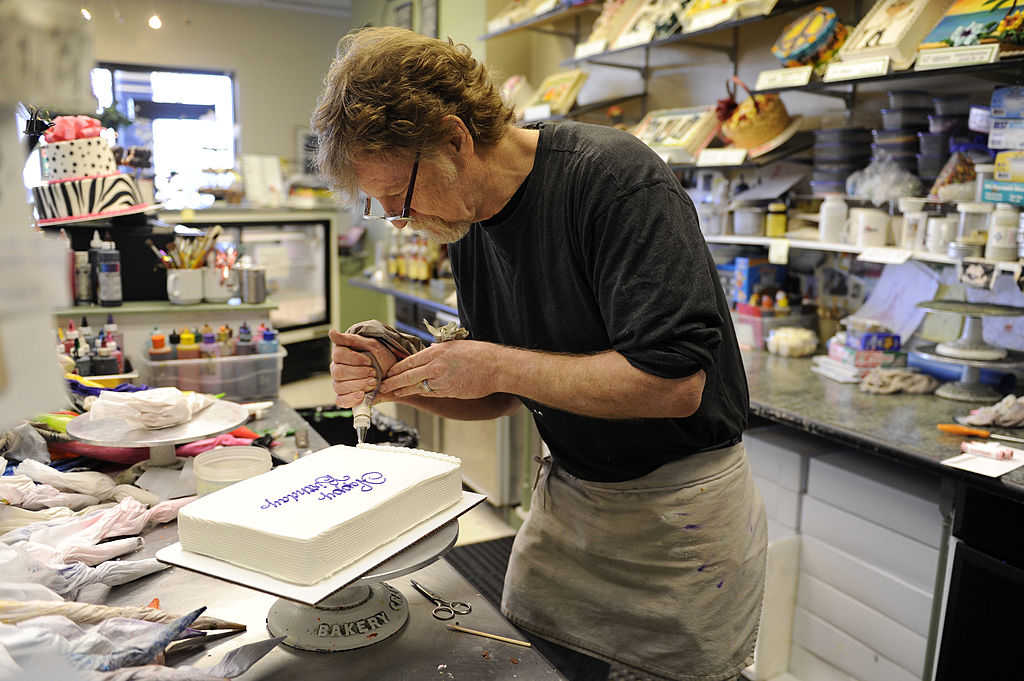Amid the religious liberty cases increasingly heading to the courts, there’s one prominent legal battle that could potentially have some sweeping ramifications: Masterpiece Cakeshop v. Colorado Civil Rights Commission.
It’s a case that surrounds baker Jack Phillips and his Masterpiece Cakeshop in Lakewood, Colorado. Phillips, much like Oregon bakers Aaron and Melissa Klein and numerous other wedding venders across the U.S., has found himself in the crosshairs of the government as well as LGBTQ activists after declining in 2012 to make a wedding cake for a same-sex couple.
The baker is waiting for the Supreme Court to decide whether to weigh in on his case, as he’s been locked in a tough legal battle with the Colorado Civil Rights Commission for the past five years. The agency ruled that his cake refusal was in violation of anti-discrimination laws and punished him accordingly.
According to his attorneys with the Alliance Defending Freedom, a conservative legal firm, Phillips was forced to engage in “re-educating his staff and filing quarterly ‘compliance’ reports for two years.”
The baker’s legal battle first touched off in July 2012 when couple Charlie Craig and David Mullins approached him to make a cake for their same-sex ceremony and he “politely declined.” The couple filed a complaint with the state’s civil rights commission and are now represented by the American Civil Liberties Union.
Phillips asked the Supreme Court to take up his case after the Colorado Supreme Court declined to do so last April and after the Colorado Court of Appeals backed the civil rights commission’s discrimination determination, as Deseret News reported.
Attorneys for Phillips argue that no American should be forced to use creative or artistic expression if doing so violates his or her conscience, as this baker has claimed it does.
Phillips said his opposition is based on his biblical view of marriage, with the baker proclaiming that he would similarly reject cakes with “offensive written messages and cakes celebrating events or ideas that violate his beliefs, including cakes celebrating Halloween, anti-American or anti-family themes, atheism, racism, or indecency,” as previously reported.
“No one — not Jack or anyone else — should be forced by the government to further a message that they cannot in good conscience promote,” Alliance Defending Freedom senior counsel Jeremy Tedesco said in a statement. “And that’s what this case is about.”
But Ria Tabacco Mar, an ACLU attorney who represents Charlie Craig and David Mullins, said that the case surrounds Phillips refusal to sell certain products to homosexual couples that he sells to heterosexual couples (i.e. the wedding cake). Mar said the equal protection clause under the 14th Amendment trumps the First Amendment in public accommodations cases.
“We all have a right to our personal beliefs, but we do not have a right to impose those beliefs on others and harm them,” Mar said in a statement issued last year.
The two sides hold very different views on the matter, with Phillips suspending all wedding cake orders back in 2014 to avoid any fines or further legal proceedings. But with conservative Supreme Court Justice Neil Gorsuch now seated on the high court, there’s a chance that the case could soon be heard in the nation’s most powerful court.
So far, the Supreme Court has delayed making a decision on hearing the case, but it is noteworthy that the justices previously declined to hear a similar case in 2014 involving a New Mexico photographer yet have continued to weigh whether to take up Phillips’ battle, as Reason noted.
Perhaps it’s possible the situation will be different this time around now that Gorsuch is seated and now that gay marriage has been legalized across the land, increasing the likelihood of similar cases emerging in the future.
As the first nominee of Republican President Donald Trump, Gorsuch has already heard arguments in a separate religious liberty case — Trinity Lutheran Church of Columbia, Inc. v. Comer, which centers around a Missouri government program that provides grants for tire-based resurfacing.
As Faithwire previously reported, at the center of the dispute is a church-owned preschool’s claim that it was blocked from receiving a grant for these rubber playground materials due to its affiliation with Trinity Lutheran Church in Columbia, Missouri.
Read more about that case here.
—
Other Must-Read Stories:
– Pastor Is ‘Traumatized’ and Scared After Discovering What Was Inside Mysterious Package
– Here’s How Many Millennials Now Live With Their Parents
– ‘It’s a War on Christians’: Egyptian Teen Reportedly Murdered by Muslim Radicals Amid Ongoing Chaos



